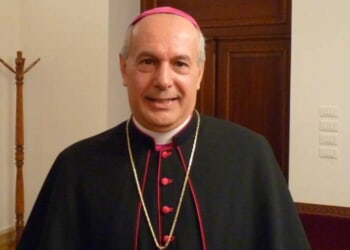The deepest desire of our hearts is to be loved, and through that love, to be healed. We see this desire for healing everywhere in our culture. Americans spend billions of dollars on dieting and fitness products every year. Roughly 30% of Americans have seen a therapist in the last five years. Self-help books are one of the most popular genres on the market. We have a deep longing for healing, but where do we truly find the healing we crave?
Discalced Carmelite Friar Daniel Chowning tackles this question in his recent book, Healed by Love: Contemplation as a Path of Healing with St. John of the Cross. Throughout the book, Fr. Chowning examines the human need for healing through the lens of St. John of the Cross as well as where ultimate healing is found. In this article, I will examine what keeps us from finding healing according to St. John of the Cross, and next week we’ll look at how the Lord heals us through His divine love offered through contemplation.
There are many areas of our lives that need healing: trauma, grief, generational sins, habitual sins, ignorance, addictions, co-dependency, and even pathologies we are not fully conscious of. The greatest area of our lives that needs healing is sin. In our fallen state, the flesh and the spirit are at war. As Fr. Chowning points out, we are:
. . . easily dispersed, fragmented, and swept along by emotions such as anger, jealousy, envy that go contrary to Gospel love. To live selfishly, dispersed, and divided within ourselves leads to dysfunctional behavior, and eventually to a disintegration of personality. All types of spiritual, emotional, and even physical illnesses are born from this interior warfare. We stand in need of a profound healing at the deepest level of our being.
This warfare is because we often place the created things of this world above God. He has made us for and by love, but in our fallen state, we seek created goods over the Creator. We place our hopes in wealth, power, sex, food and drink, esteem, relationships, and other aspects of this world. In principle, these things—even people—can never fulfill us.
As we place greater and greater emphasis on created things for our happiness, the more fragmented we become. This is especially true in the West where we are constantly told that our happiness comes from consuming and amassing things, worldly success and power, or placing all our hopes on some ephemeral relationship that will supposedly complete us, and if it doesn’t, then we can discard that person and move onto the next one.
What these desires ultimately reveal about us is that we are selfish, and this selfishness needs to be confronted, or we cannot progress spiritually. In fact, it is impossible to find true happiness so long as we live in the confines of our own selfish ego. The Lord came to save us from this tendency and calls us to a better way. He desires to heal the disharmony that exists within us caused by our selfishness.
The process of healing can only begin once we realize that we are in need of radical transformation. St. John of the Cross understood at a deep level that this transformation process is one of purification and detachment. This is necessary because without this process we remain slaves to our “disordered appetites.” Fr. Chowning again:
The first text where St. John of the Cross analyzes the pathology of the soul is in Book One of The Ascent of Mount Carmel, chapters 6-11. He begins by analyzing the situation of beginners in the spiritual life who are enslaved by what he describes as “disordered appetites.” The people he describes are immersed in a world of dispersion and fragmentation, relating on the superficial level of life, enslaved by the pleasure principle. They are swept along by their emotions, selfish desires, and attachment to sensual pleasure. The image of an “enslaved heart” appears throughout John’s description of these beginners.
A “disordered appetite” according to St. John of the Cross “is an irrational impulse that moves a person to satisfy his needs primarily in view of the pleasure he experiences in them. The one who is the slave of the appetites, eats, touches, sees, feels only for the satisfaction he finds; the true values for him are those that can give him this kind of satisfaction.” The person who operates in this manner—which is probably most of us on the way—is enslaved by pleasure. We cannot seek higher goods because we seek worldy pleasures rather than the treasures of heaven. Many people stay in this fragmented state because they will not relinquish their addictions to God.
In one of St. John of the Cross’ more famous quotes he explains how this slavery keeps us tethered to the earth. “It makes little difference whether a bird is tied by a thin thread or a cord. Even if it is tied by thread, the bird will be held bound just as surely as if it was tied by cord.” The point he is making is that no matter what enslaves us—even if it is not gravely sinful—it keeps us from flying higher and higher into the Most Holy Trinity. We become stuck and make very little progress so long as we remain trapped in the pleasure principle. We end up serving two masters.
Spiritual sickness arises out of our disordered appetites. We suffer spiritually, psychologically, and even physically because of this sickness. St. John of the Cross’ solution is to seek and allow Christ to purify these appetites:
If you desire that devotion be born in your spirit and that the love of God and the desire for divine things increase, cleanse your soul of every desire, attachment, and ambition in such a way that you have no concern about anything. Just as a sick person is immediately aware of good health once the bad humor has been thrown off and a desire to eat is felt, so will you recover your health, in God, if you cure yourself as was said. Without doing this, you will not advance no matter how much you do.
To begin the path to healing, we must seek to root out those areas of our lives where we are addicted to the pleasure principle. We cannot do it alone, so we must cooperate with the Lord as He seeks to purify us. This leads us into the dark night of the senses and the spirit. This long process is where we come to know the darkest parts of ourselves and where we are most in need of healing. Anyone who allows the Lord to lead them into the dark night, comes away aware of their great sinfulness and need for the healing only Christ can provide.
One of the great dangers in the process is to fall into Pelagian self-reliance, which leads us to believe that we have the power to overcome our disordered appetites. We do not, and the Lord intentionally leads us to places of powerlessness to destroy this illusion.
The other danger is to reduce the spiritual life to the moral law only. We see this in the Lord’s discussion with the rich young man in Matthew 19:16-30. He has followed the law since his youth, but the Lord sees deeper into his heart. He is attached to the things of this world. There is a danger in the Church today, to reduce the spiritual life to the letter of the moral law and nothing more. The Lord has made us for total freedom and healing through intimate union with Him. He wants nothing to stand in the way of our relationship with Him. This healing can only come about when we relinquish our desire for the things of this world and seek the treasures of heaven. Remember St. John of the Cross’ thread? Anything that is not surrendered to God ultimately fragments us.
We’ve briefly covered—read Fr. Chowning’s excellent book for in-depth coverage—the need for healing in our fragmented state and how we must confront and root out the pleasure principle caused by the disordered appetites in our lives. Next week, we will examine why purification is necessary and how it is ultimately the love of Christ found in contemplation that heals us.
Photo by Phil Jolley on Unsplash












